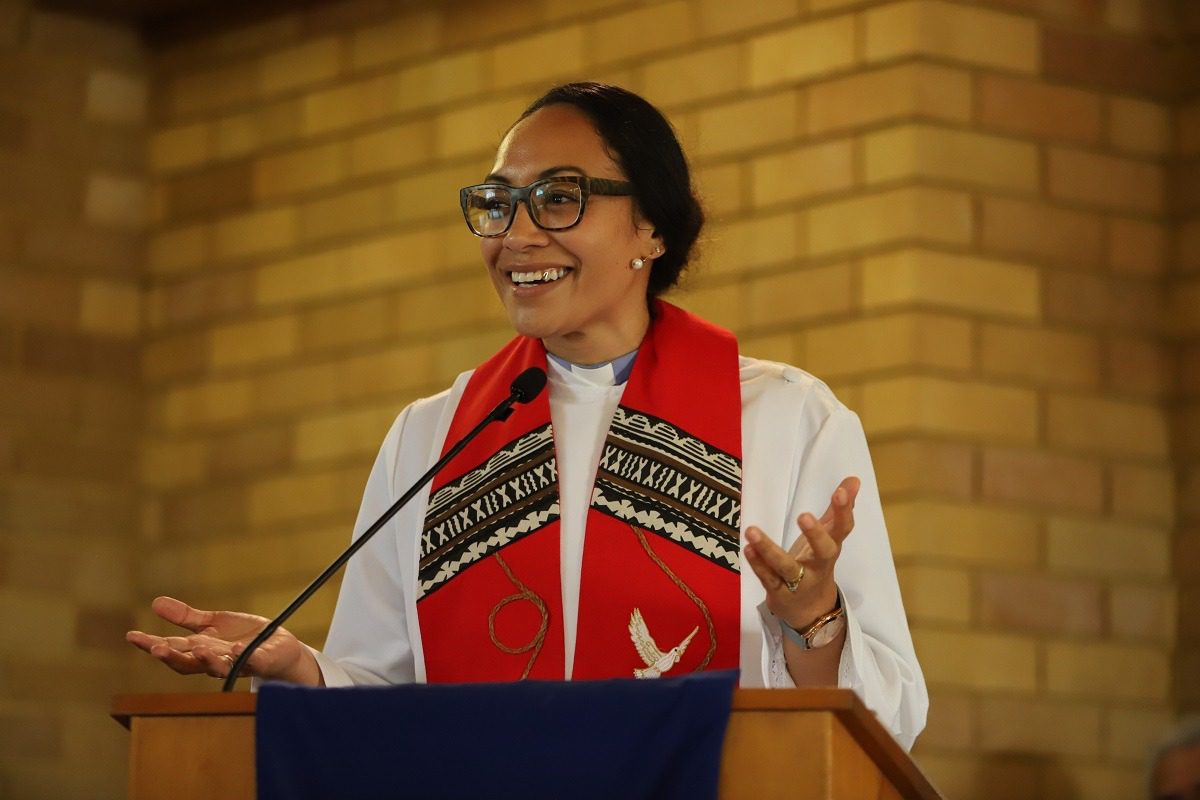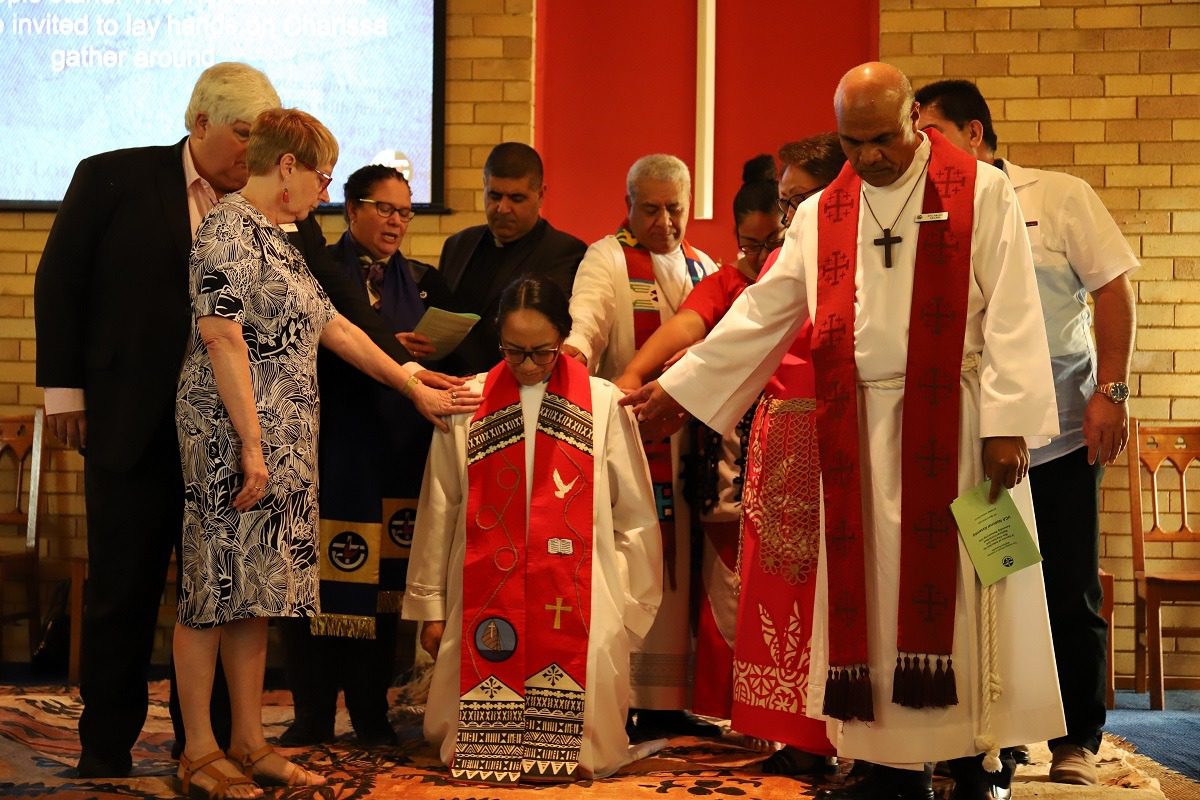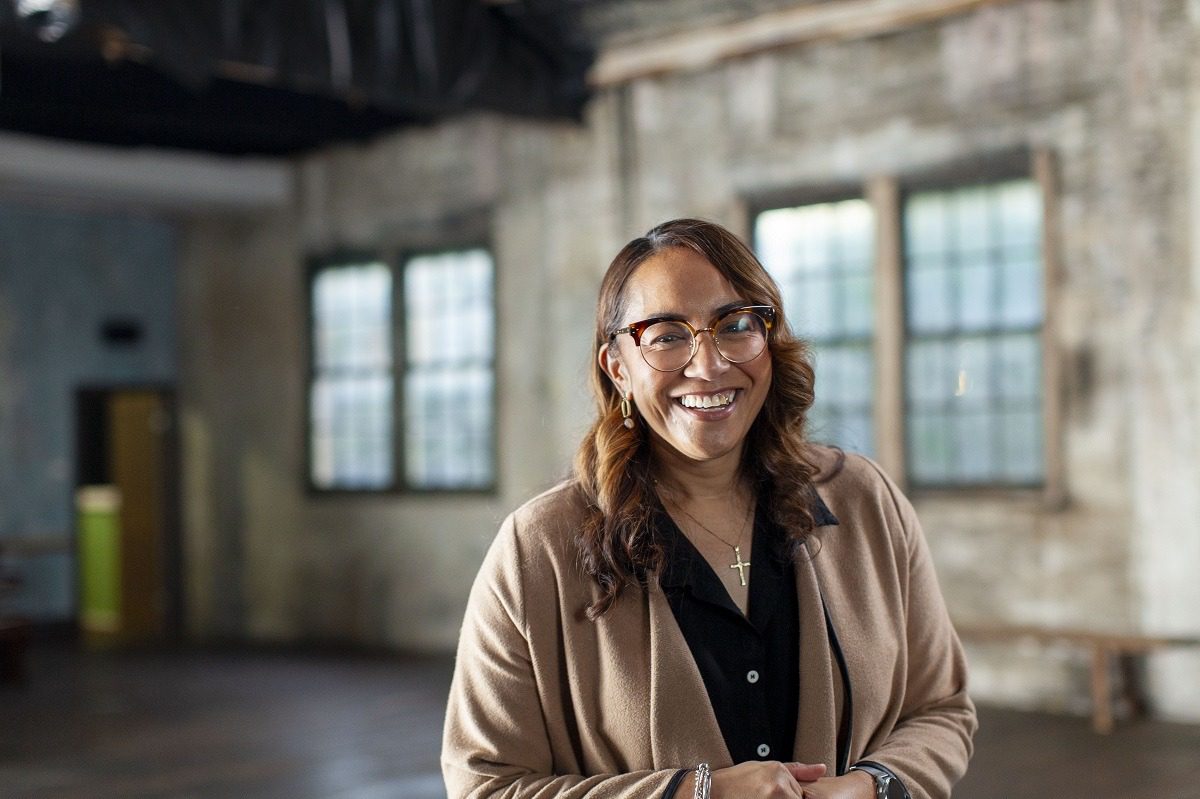By Rebecca Beisler
For Rev Charissa Suli it was an “Emmaus Walk” moment.
On the short road between Collaroy and Dee Why on Sydney’s Northern Beaches, Charissa felt a deep and unshakeable call from God to dedicate her life to serving Christ within the Uniting Church.
It was October 29, 2007 and Charissa was 25 and a young mum of three daughters.
A few years before she and her husband Langi made a pivotal decision to return “home” to the faith community where Charissa was baptised – the Uniting Church’s Cecil Gribble Tongan Congregation in Dee Why, named after a beloved missionary to Tonga.
They soon became involved in its youth group, Sunday School and lay preaching.
As a young leader with an exceptional gift for singing, Charissa was invited by Rev Salesi Faupula (now Moderator-elect of the Synod of Victoria and Tasmania) to attend a NSW/ACT Synod Cross Cultural event at Collaroy and lead worship.
Charissa clearly remembers not wanting to go, suspecting the occasion would be predominantly for people much older and unlike her.
However, she went along with Langi and two other young adults, and it changed her life.
In a surprising and enlightening way, Charissa found herself at a truly multicultural event.
“I was taken aback that a lot of the people leading at the front were actually migrant women,” she recalls.
Korean Minister Rev Aeryun Lee presented a session in the morning, and it was the first time Charissa had seen an Asian female Minister.
In the afternoon, Fijian-Rotuman Minister Rev Dr Seforosa Carroll led a Bible study.
“I remember sitting there listening to Sef,” Charissa recalls.
“She was inspiring and I was like, ‘Wow, She’s a Pacific Islander, and she’s a Rev. She looks so young’.
“And I remember from that moment, I thought, ‘I could do that’.”
On that day Charissa also met Rev Dr Tony Floyd, then Assembly Multicultural and Cross-Cultural Ministry National Director.
It was the beginning of a friendship and mentorship that would open the door for Charissa to the wider national church and begin her thinking about her identity as a second-generation Tongan woman.
So, on the way home that day, a short 5km drive from Collaroy to Dee Why, Charissa tells Langi to pull over on the side of the road.
“I say to him, there is this thing I need to tell you,” she recalls.
“I am crying my eyes out, and he says to me, ‘I know what you’re going to say’. And I say to him, ‘look, I just need to tell you’, and we both turn to each other.
“I say, ‘I want to become a Minister’, and Langi says to me, ‘you should become a Minister’.
“It literally was the Emmaus Walk where our hearts were on fire.”

Charissa has overcome many obstacles on her path to UCA President.
In this defining moment Charissa’s journey of ministry and service began, culminating last month in an historic moment in the life of the Uniting Church.
On July 11, Charissa was installed as the 17th President of the Uniting Church, the first person of colour, of Pacifica heritage, and of Tongan descent, to lead the church nationally, and the youngest to serve in the role.
At a time of great challenge, Charissa will offer spiritual leadership to the Church.
She will draw upon her deep faith in Jesus and her Pacifica heritage, which have played a central and grounding role through seemingly impossible challenges on her path to leadership.
In the 1970s, Charissa’s grandparents left Tonga for New Zealand with their 12 children, sacrificing all they had for the sake of future generations.
Charissa was born in Australia and schooled in New Zealand, until she and her mother returned to Australia to be closer to her elder brother, who was having his first child.
However, at 16 Charissa’s indomitable spirit was forged in the crucible of early motherhood.
She married Langi and gave birth to their baby girl, Susitina.
“It changed the whole narrative of my life,” she says.
“I had no choice but to drop out of high school.
“I was a child having a child. I grew up very quickly.”
Carrying the shame of a teenage pregnancy, Charissa describes the years that followed as a time of “wilderness”.
“There was so much heavy baggage,” she says.
“Life was so hard, and we felt so poor.
“The thing that held tight, I truly believe, for myself and Langi and our family, was our faith in God.”
With the foundational support of her mother, her husband and her deep faith, Charissa forged a path ahead.
She became successful in finance and marketing, and she and Langi had two more daughters, Kina and Latu, and more recently, a son, Azariah Inoke.
Fast forward to 2007 and having just experienced a powerful call to ministry, Charissa made the decision to quit her job, forgo her six-figure salary and begin a Period of Discernment.
Again, Charissa pushed back against cultural expectations and boundaries, with many questioning her sense of call.
She pushed past the doubters and has not looked back.
She began work as a Cross-Cultural Consultant for the Synod of NSW/ACT.

Charissa during her induction into the role as Assembly National Consultant.
In this role, she attended an executive meeting of the Uniting Church Tongan National Conference and met another key mentor, Rev Dr Jason Kioa, Chairperson at that time of the TNC.
At that meeting, Jason and the executive appointed Charissa as a second-generation leader, a role she held for 10 years, and which cultivated her gifts for leadership and her passion for intercultural and intergenerational ministry.
Charissa completed her theological studies with a Bachelor of Theology and, in 2014, was ordained as a Minister of the Word in the Uniting Church.
She first served as Minister at Dapto Uniting Church, then as Assembly National Consultant and most recently with Sydney Presbytery.
She has a Graduate Diploma in Ministry and is currently completing a Masters in Theological Studies.
The theme Charissa chose for last month’s Assembly was ‘Threads of Love: Weaving Christ’s love across cultures and boundaries’, representing the bold vision she holds for a spiritual renewal across the Church.
“I believe we need a renewal of our commitment to the Gospel,” she says.
“We need to reflect deeply on what it means to be the body of Christ together.
“If the business agenda and our strategic plans become more important to us than the Gospel and our relationship with God and each other, then we need to flip the script, because it should be the other way around.”
The image used in the theme is one of weaving, a communal practice and honoured skill in many cultures.
The process of lalanga (weaving) the Tongan fala (mat) is a highly valued craft, requiring commitment, patience, skill and intentionality, and is a source of fellowship and joy.
“Each strand of the Fala is important to each other in the same way that the Holy Spirit gifts and empowers all members of the Church,” Charissa says.
“A reference to Paul’s Letter to the Colossians (3:14), and ‘threads of love’ spotlights the transformative love of Christ.
“The key point for me is that as Christians and people of faith we underestimate how broad, wide and deep the love of Christ is and that Christ’s love is so powerful that it can hold our diversity, if we would just take a chance and allow Christ’s love to transform us from within.”
As well as weaving the mat so there is space for all, Charissa says the theme also calls the church to “unweave” the strands that hinder us.
“The theme calls for self-reflection and action to address the broken strands, in our society and in the Church,” she says.
“This involves identifying areas of inequality and injustice, lamenting past wrongs and working actively towards healing and transformation.”

“I still can’t wrap my head around it, it’s unbelievable but I’m humbled as I stand on the shoulders of giants who have come before me,” says Charissa. Image: The Signal Box Pty Ltd
For Charissa, one of the greatest challenges the Church must face is its own structural and cultural racism.
“I believe a lot of the structural racism is unconscious in the Church, and because we’re not aware of it, it actually hinders how we can be in relationship,” she says.
“We need to dismantle structural racism, ensuring that the commitments we’ve made are not just symbolic but deeply embedded in our governance and practices.”
This starts with how we can be in a better relationship with the First Peoples of this country and with the Uniting Aboriginal and Islander Christian Congress, says Charissa.
“I truly believe until First Nations people feel and find their voice in the Uniting Church, only then can we Second Peoples find our voice too, and that needs to be our first priority,” she says.
Charissa also cites the importance of crossing cultural divides.
As a proud Tongan, she has long been an advocate for the culturally diverse voices of the church to be elevated and celebrated.
“When people say the Church is dying, it is often focused on a particular group of the Church which is predominantly the white Anglo communities,” Charissa says.
“When I look at the CALD communities, they are growing their number, impact and mission.
“I believe there’s an opportunity for migrants and indigenous communities to influence how we offer hospitality and be in relationship with each other in the Uniting Church.
“This journey requires a commitment to ongoing reformation and renewal and the space for grace.”
Looking back on the Emmaus Walk experience on the road from Collaroy to Dee Why, Charissa is still in awe at the journey God has taken her on.
“I still can’t wrap my head around it, it’s unbelievable but I’m humbled as I stand on the shoulders of giants who have come before me,” she says.

